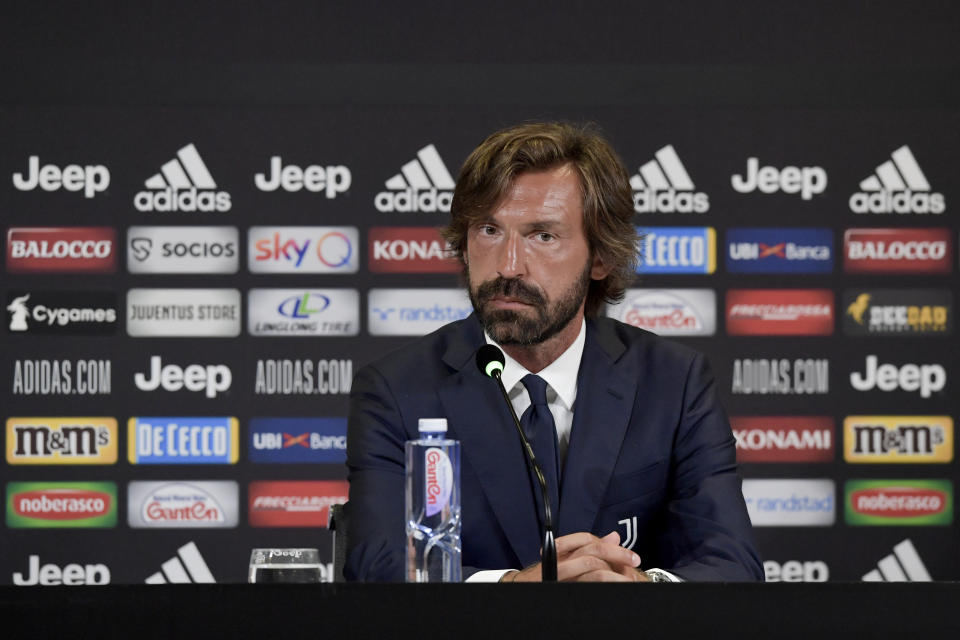What Andrea Pirlo's hiring at Juventus says about managing modern mega-clubs
Going forward, the most powerful soccer team in Italy and one of the true aristocrats of the global game will be led by a man with nine days of managerial experience. A team that has won the ever-competitive Serie A an astounding nine seasons in a row has appointed a head coach who has yet to actually oversee a competitive game, for his appointment to his last team came over the summer.
On July 30, Andrea Pirlo was put in charge of the Juventus under-23 team, which plays in the third-tier Serie C. It had been less than a year since he had enrolled in Italy’s fabled Coverciano coaching academy, where the doctrine of defending, organizing and nursing narrow leads is stamped on future managers. On Saturday, the 41-year-old Pirlo, less than three years removed from his playing career, got promoted to first-team manager after Maurizio Sarri was fired for his failure to reach the Champions League quarterfinals, win the league by a wider margin or, apparently, to get along with the expensive veterans who were never going to suit his up-tempo system anyway.
So now it is Pirlo, who is known for the precision with which he delivered passes as a player, orchestrating his teams to a World Cup title, two Champions League crowns and six Serie A trophies — including four with Juve. Pirlo, who is known for having really nice hair and growing a hell of a beard. Pirlo, who looks so regal holding a glass of wine that it is as if wine was invented expressly for him to hold in a crystal glass, to make him look so good. Pirlo, the pricey, immovable bust at New York City FC in the last few whimpers of his storied career, long after he’d earned the nicknames of “the architect” and “the professor” and “maestro” and “Mozart.”

But for all the things Pirlo lacks, he also holds a key asset Sarri never had or acquired during his unhappy one-year stint with the club: Pirlo is steeped in the club culture. Pirlo was around for the first four years of this unprecedented rampage of consecutive titles. In 2011, he’d been discarded by rival AC Milan, which deemed him old and used up after a decade of transcendent service, only to mastermind a new dynasty and lead Juve to the Champions League final in his last season there.
Pirlo, while hardly a one-club man — he came up with Brescia, briefly joined Inter Milan and Reggina and finished up in Major League Soccer — is Juventus. He understands it. He grasps it intuitively. He has played with and against many of its stars. He will relate to them. That, these days, is a quality in prospective managers that appeals as much to clubs as an extensive resume does.
And in that sense, he fits in perfectly with a recent trend that has seen clubs rethink the benefits of handing control to a strong and established manager. Until recently, most major clubs would hire a manager whose vision for the team spoke to them and whose resume suggested he could deliver on it. That meant that the look of a team changed dramatically from one manager to the next, and while such flux might bring trophies (or not), it was also an expensive and inconsistent way of doing business, necessitating a great deal of player turnover in the pivot from one system to the next.
Take a step back and the amount of control given to head coaches was often astounding, given that they are essentially middle-managers in a much larger structure. Leaving your manager in charge of personnel, policy, philosophy and budget all at once, as was the norm until quite recently, is akin to a chain of department stores allowing a single store manager to plot out strategy for the entire company.
But in the wake of Real Madrid’s success with promoting Zinedine Zidane to manager — a position he was, in the traditional sense of the word, wholly unprepared for — and seeing a return of three Champions League and two La Liga titles in just under four seasons, the model has become enticing to others.
Frank Lampard, Derby County manager for all of a year before Chelsea brought him home, had unexpected success in his first season, comfortably qualifying for the Champions League and reaching the FA Cup final with a young and transitional team. Even Ole Gunnar Solskjaer is turning things around at Manchester United, albeit in fits and starts, after appearing for a time to be out of his depths at his old club. Mikel Arteta might well work out at Arsenal in his first job running a first team — it’s too soon to tell. Of course, Pep Guardiola is the archetype from when he was put in charge of Barcelona in 2008 at age 37.
There were more qualified managers available to Juventus, Mauricio Pochettino chief among them. But they would have insisted on big changes, the way Sarri did. They might have performed major surgery on the first team but done so without understanding the club’s larger DNA. Pirlo understands the DNA. Pirlo might get along better with superstar Cristiano Ronaldo and others, and intuit how to make the most of their still-ample skills. That’s what clubs seem to want now: not to be remade, but to be understood, to be maximized. And you can’t do much better than going with someone who has been steeped in the club’s culture, who has spent hundreds of days in the locker room already.
Considered in that light: Andrea Pirlo was the ideal candidate for Juventus.
Leander Schaerlaeckens is a Yahoo Sports soccer columnist and a sports communication lecturer at Marist College. Follow him on Twitter @LeanderAlphabet.
More from Yahoo Sports:
